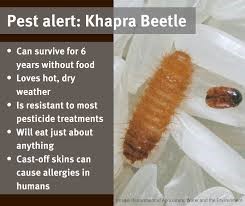The Department of Agriculture Fisheries and Forestry (DAFF) has issued industry update 141-2024 today (01 July 2024): “Update to BICON case and importer declaration template for khapra beetle sea container measures.” The pest which has the technical name of Trogoderma granarium is a small but serious threat found mainly in stored grains, but also in rice, oilseeds and dried foodstuffs. The damage it could cause in Australia cannot be overstated.
If the beetle was to establish here, many of our trading partners would simply reject stored produce from Australia. Given that we export much of the grain we grow, the bug could cause devastating losses, affecting the nation’s economy. Containers from target risk countries are treated either using methyl bromide, heat treatment or pesticides and issued with a valid certificate before leaving the port of export.
Merging of BICON conditions.
On Monday 15 July 2024, DAFF will move all conditions from the khapra beetle sea container measures BICON (Biosecurity Import Conditions) case into the non-commodity cargo clearance case. There will be no change to the measures themselves. The khapra beetle sea container measures case will remain active for a period of time and will direct users to the non-commodity cargo clearance case.
Measures applying to sea containers.
Sea containers must be treated offshore and meet the import conditions specified in the “khapra beetle sea container measures” and “non-commodity cargo clearance” BICON cases respectively. Further measures may also apply to the goods within the container.
Khapra beetle measures apply to Full Container Load (FCL)* containers being exported from khapra beetle target risk countries when the container is either:
– packed with high-risk plant products, or
– will be unpacked in a rural khapra risk postcode (see postcode list).
*ISO tanks, reefers (including non-operational), flat racks, LCL/FAKs and empty containers are excluded from these requirements.
Approved arrangement class 19 for khapra beetle sea container measures.
Those who operate under approved arrangement class 19 must report and manage khapra beetle risk (for non-commodity) by:
– assessing documentation for target risk containers packed in a khapra beetle target risk country that will be unpacked in a rural khapra risk postcode in Australia
– ensuring target risk containers are accompanied by appropriate certification and the AEI is reported to address khapra beetle risk; and
– reporting if a container subject to khapra beetle measures does not meet requirements, through the khapra concern type (KPRA).
Importer declaration template update.
Importer declarations may be requested by DAFF to verify the unpack location of containers initially reported with a delivery address in a khapra risk postcode. The template is available on the khapra beetle sea container measures webpage or in BICON. On Monday 15 July 2024, DAFF will update the importer declaration template as follows:
– Amend the heading.
– Include an entry number field.
– Include the additional statement “The goods will not be repacked into this/these container(s) for final delivery to a khapra risk post code”.
Importer declarations requested by DAFF on or after 15 July 2024 will be required to be in the updated format.
See this related article from our archives: Launch of New Website for Hitchhiker Pests
For correct information about all your imports, including quarantine inspections and treatments, contact us here at Colless Young. As licensed Customs Brokers and International Freight Forwarders, we handle your cargo economically and professionally. Based in Brisbane, Colless Young provides a complete range of logistics services, including exports, both by sea and airfreight, at all major Australian ports and airports.

